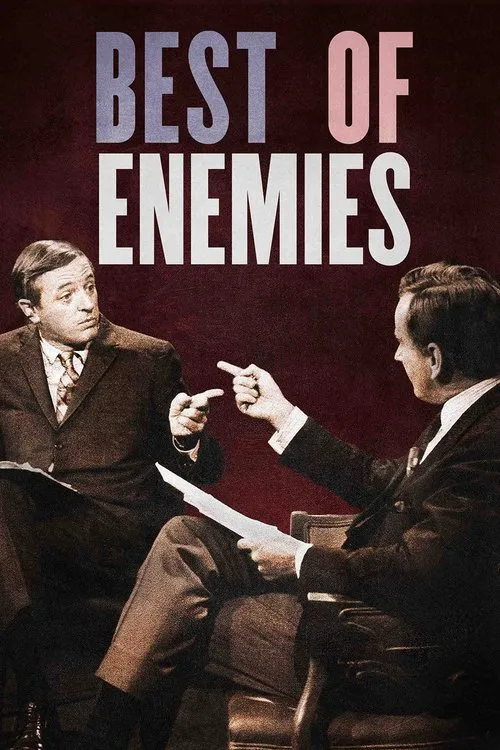Best of Enemies

Plot
In the summer of 1968, two of the most iconic minds of America's intellectual elite faced off in a series of televised debates that would forever alter the dynamics of public discourse. William F. Buckley Jr., a conservative philosopher and the founder of the magazine National Review, and Gore Vidal, a liberal author and social commentator, locked horns in a battle of wits that captivated audiences nationwide. The debates, produced by ABC News and hosted by Howard K. Smith, became the stuff of legend, marking a milestone in modern media history and leaving an indelible mark on American politics. At the time, Vidal and Buckley were already accomplished intellectuals with a wealth of writing and speaking experience between them. Vidal, a grandson of Ambassador Lincoln MacVeagh, had gained recognition for his novels, including the best-selling The City and the Pillar and Myra Breckinridge. Buckley, the scion of an influential Texas oil fortune, had established himself as a prominent figure on the right through his writings and his magazine, which had become a leading voice of conservative ideology. As the debates approached, tensions ran high. Buckley, known for his sharp tongue and acid wit, had a reputation for ruthlessly dismantling his opponents. Vidal, with his sharp intellect and quick wit, was no stranger to controversy either, having made waves with his critiques of American capitalism and imperial ambition. Their differences were clear-cut, with Buckley representing the stalwart views of the right and Vidal championing the liberal ideals of social justice and reform. The debates themselves were a far cry from the sedate, staid forums of yesteryear. Gone were the stodgy lectures and predictable talking points; in their place was a high-stakes game of intellectual one-upmanship, where each debater sought to outdo the other in a battle of wits. The format was deliberately provocative – each debate was to last an hour, with each opponent allowed an opening statement, followed by rebuttals, counter-rebuttals, and finally, closing remarks. The debates began on September 13, 1968, with Buckley and Vidal facing off on the topic of "The Negro in America." The conversation quickly devolved into a fiery exchange, with each debater trying to outmaneuver the other. Buckley launched a scathing critique of Vidal's views on civil rights, accusing him of being soft on the issue. Vidal, undaunted, counterattacked with a series of withering barbs, questioning Buckley's commitment to social justice and lampooning his views on the Vietnam War. As the debates continued, the rhetoric became increasingly heated. Buckley accused Vidal of being a "crypto-Nazi" and a "red-baiter," while Vidal retaliated by labeling Buckley a " crypto-Tarleton" – a reference to a wealthy, bigoted plantation owner in one of Buckley's own short stories. The exchanges were as much about personality as they were about policy, with each debater trying to outdo the other in a struggle for intellectual dominance. Despite the acrimony, the debates drew widespread attention. The viewing figures were impressive, with millions of Americans tuning in to watch the dueling intellectuals go head-to-head. The debates were also widely covered in the media, with newspapers and magazines scrutinizing every detail of the exchanges. For all its spectacle, the debates also contained a deeper significance. The 1968 debates coincided with a period of great social upheaval in the United States. The Vietnam War was raging, protests against it were spreading nationwide, and the Civil Rights Movement was still in full swing. As the debates played out, they served as a metaphor for the broader divisions of American society. In the aftermath of the debates, the nation was left to ponder the impact of television on public discourse. Had the spectacle of the debates trumped the substance of the arguments, as Vidal later claimed? Or had the debates, in fact, served as a necessary counterpoint to the stodginess and complacency of American politics? The answer, much like the debates themselves, remains a matter of interpretation. As we look back on the Best of Enemies debates, we see a moment when the dynamics of American politics were irrevocably changed. The debates marked the beginning of the end of an era, when rational discussion and civility were gradually eclipsed by the demands of television and the cult of celebrity. And yet, they also represent a moment of raw intellectual power, when the very best of American minds came together to exchange ideas and challenge their opponents. The debates of 1968 were, in the end, a moment of high drama and intense intellectual exchange, but also a sobering reminder that the greatest ideas are often those that challenge the status quo, rather than simply reinforcing it. As we navigate our own complex landscape of politics and social discourse, the lessons of the Best of Enemies debates remain as relevant as ever.
Reviews




